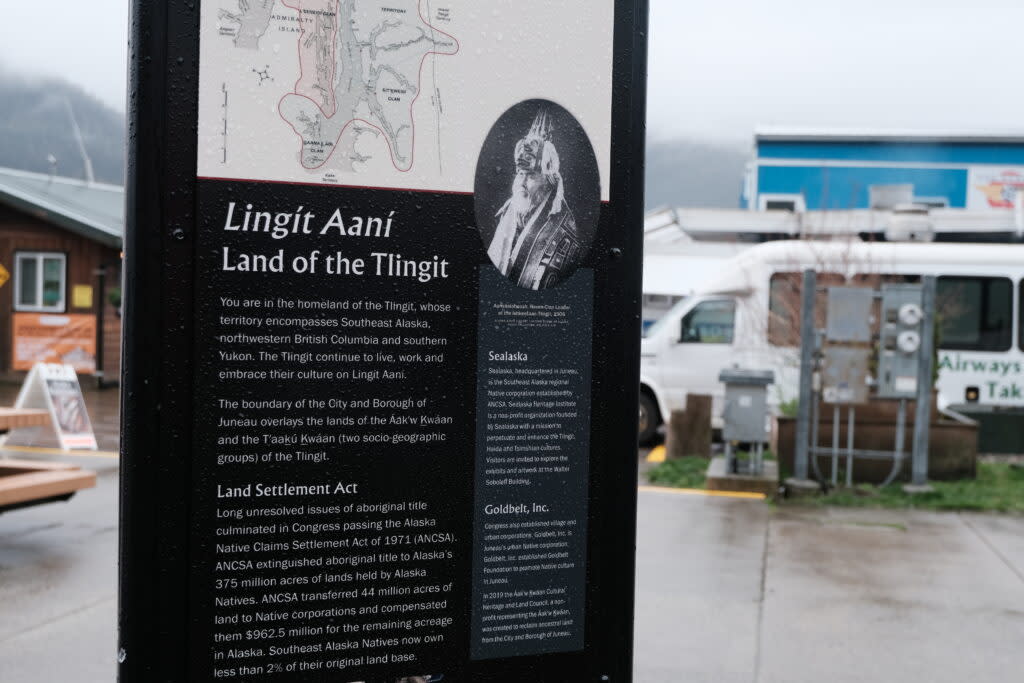Lawmakers boost Council for Alaska Native Languages with new name, more languages and members

A sign in downtown Juneau informs readers that the land is called Lingít Aaní, or the land of the Tlingít people on May 7, 2024. In 2018, Gov. Bill Walker signed A.O. 300, which recognizes a linguistic emergency for Alaska Native languages, which was a recommendation of the Council for Alaska Native Languages. It promotes, among other efforts, the use of Alaska Native place names in signage. (Photo by Claire Stremple/Alaska Beacon)
Lawmakers added four Alaska Native languages to the state’s official language tally and renamed the council that advocates for their survival and revitalization on Friday.
Members of the Senate approved their version of House Bill 26 with a unanimous vote on Monday. State Representatives concurred with the changes on Friday, which means it goes to Gov. Mike Dunleavy next. The House passed the original bill, sponsored by Rep. Andi Story, D-Juneau, last year with a 37-1 vote. Rep. David Eastman, R-Wasilla, was opposed.
In addition to adding official languages, the bill contains other changes to the council. Its name was changed to the Council for Alaska Native Languages from the Alaska Native Languages Preservation and Advisory Council, with a goal of doing more than just preserving the 23 languages. The number of members on the council will increase from five to seven. And the council will now reside in the Department of Education and Early Development rather than the Department of Commerce, signaling the importance of education to its work.
Sen. Donny Olson, D-Golovin, carried the bill in the Senate. He said the changes reflect the council’s mission, which is to increase the usage of Alaska Native languages.
“These minor changes will have a major impact on the Council for Alaska Native Languages and will help carry languages from our past into the future for generations to come,” he said.
X̱’unei Lance Twitchell, the council’s chair, spoke in support of the bill in a January Senate Finance committee meeting, where he called Alaska Native Languages the state’s “oldest living resource.”
Twitchell reminded the committee that Alaska Native languages are no longer spoken as a result of assimilation policy and the state’s history of boarding schools and said the state had not yet shown that the languages are a priority despite their worth: “Every single Alaska Native language is sacred and irreplaceable. It contains concepts that cannot be translated, it contains things that cannot be replaced, and that give a sense of fulfillment and wholeness and health to Alaska Natives and to non-natives in Alaska.”
The council’s biennial report was published this year. It calls for lawmakers to implement systemic reforms to support the languages, many of which are in danger of dormancy.
House Bill 26 adds Cup’ig, Middle Tanana, Lower Tanana and Wetal will join English, Inupiaq, Siberian Yupik, Central Alaskan Yup’ik, Alutiiq, Unangax, Dena’ina, Deg Xinag, Holikachuk, Koyukon, Upper Kuskokwim, Gwich’in, Upper Tanana, Tanacross, Han, Ahtna, Eyak, Tlingit, Haida, and Tsimshian as official state languages. Middle Tanana and Lower Tanana were previously listed as one language.
Last year, Rep. Maxine Dibert, D-Fairbanks, said she supported the bill in part because one of the languages to be added is endemic to the Middle Tanana region her family is from.
Eastman, the sole vote against the legislation in 2023, contended that dormant languages, such as Wetal, should not be considered for status as state languages because they are not regularly spoken.
Reps. Kevin McCabe, R-Big Lake, and Justin Ruffridge, R-Soldotna, defended the languages’ inclusion and pointed to language revitalization efforts in communities where they have lived.
“It’s important to recognize that, although a language may have not been spoken for quite some time, that there is still a memory of that language. And we would do well to remember that there is a history there, and that that may come back at any time,” Ruffridge said.
GET THE MORNING HEADLINES DELIVERED TO YOUR INBOX
The post Lawmakers boost Council for Alaska Native Languages with new name, more languages and members appeared first on Alaska Beacon.

